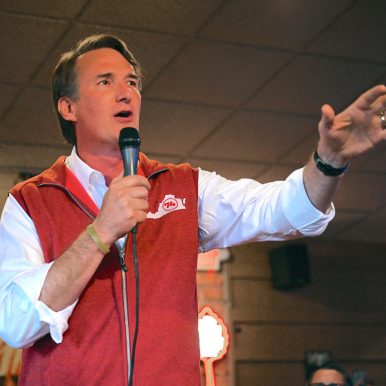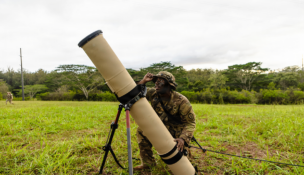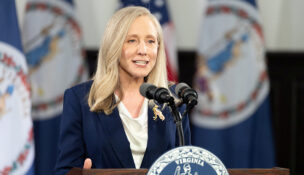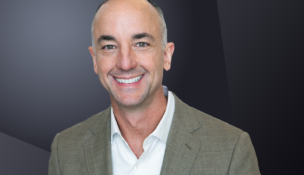Vested interest
Gov. Youngkin talks 2022 economic wins, what’s next
Vested interest
Gov. Youngkin talks 2022 economic wins, what’s next
Eleven months into his first term in elected office, Gov. Glenn Youngkin can boast of several economic development successes and a few legislative wins, but one thing a lot of observers are discussing is his national profile and what it could mean in 2024.
Youngkin — and his careful campaign to win over not only Trump fans but moderates who didn’t support the 45th president — is of keen interest to politicos who see him as a possible model for other GOP candidates seeking office.
The governor‘s frequent appearances on Fox News and his hectic travel schedule, which has included trips to stump for Republican candidates in Connecticut, Maine, Arizona, Michigan, Oregon and other states, has raised questions about whether Youngkin views his governorship as a steppingstone to a presidential run in 2024.
During an October appearance on CNN’s “State of the Union,” Youngkin said the Republican Party “has to be a party where we are not shunning people and excluding them, because we don’t agree on everything.”
Virginia state Sen. Louise Lucas, who has made a cottage industry out of poking at Youngkin on Twitter, joked in September that the governor “has spent so much time in Texas that now he thinks Virginia is a border state.” Along more serious lines, she and other Senate Democrats have vowed to block abortion restrictions proposed by the governor and have spoken out against Youngkin’s new educational policies regarding transgender students. Many Democrats view the moves as discriminatory, although Youngkin said it’s meant to involve parents more fully in their children’s schooling.
In Virginia Business’ check-in with the governor, he doesn’t completely rule out running for president in 2024 but argues that his appearances in political battleground states are mainly to repay the Republican Governors Association for its support of his campaign.
Meanwhile, Youngkin has yet to embark on — or announce — any international trade missions but says he does plan to travel overseas on behalf of the commonwealth once Virginia’s economy is “sorted out.”
The former Carlyle Group co-CEO is much more comfortable talking about Virginia’s recent economic wins, including The Lego Group’s $1 billion toy factory and Plenty Unlimited Inc.’s $300 million indoor vertical farm operation, both coming to Chesterfield County. There are also the recent corporate headquarters relocations of Raytheon Technologies Corp. and Boeing Co. to Arlington, making Virginia home to the second- and third-largest space and defense contractors in the world.
In recent months, Youngkin, who has been skeptical of the state’s move toward decarbonization, unveiled a new energy policy, calling for increased investment in nuclear power. He also has called for overhauling the state’s workforce development efforts, saying that realigning the efforts of numerous agencies and hundreds of programs statewide under one umbrella will be a key part of his 2023 legislative agenda. “At the end of the day,” the governor says, “companies need workers.” — VB editors
Virginia Business: As you near the completion of your first year in office, how do you think your administration’s economic development efforts compare so far with previous governors?
Gov. Glenn Youngkin: I am very encouraged by our first eight months, and I think what we have really demonstrated is, first, Virginia’s open for business. Unfortunately, over the previous eight years, we didn’t really grow much, less than 1% on a compounded rate. We really didn’t add many jobs over the eight-year period. One of the things that I’ve been really focused on is getting our job engine cranked back up.

I think for the first six months, we were just up under 100,000 jobs. That’s very exciting, because that’s a faster rate than we’ve ever grown. It’s really important that we start growing. We were 47th in job recovery coming out of the pandemic in 2021. Now we’re in the top 15. [Editor’s note: From August 2021 to August 2022, Virginia gained an estimated 118,100 jobs, according to the Virginia Employment Commission. As of early September 2021, Virginia ranked 49th in percentage of jobs recovered since February 2020. As of June 2022, Virginia was 27th in job recovery, according to U.S. Bureau of Labor Statistics data.]
The second big thing that we’ve been able to do is demonstrate that we have a package of initiatives that are taking Virginia, which is a wonderful state for business, and we’re going to make it the best. That’s our big tax cuts that we got done in the first budget cycle … [and] our hard work on making sure we’re addressing an … overburdensome regulatory environment. Our Office of Regulatory Management is off and running.
All the work we’re doing on workforce … is hugely important in order to give companies confidence that we’re going to educate and build the workforce of the future.
Then, finally, work we’re doing to be ready for companies — sites investment, site development, is hugely important. I think that’s translated into some great wins.
… We see companies come from other states, like Boeing and Raytheon, companies that are here, like Hilton and Google, growing, [and] we see international businesses coming here like Lego … picking Chesterfield County. … Then we see new industries starting, and in the whole indoor-growing world, which has found a new hub in Virginia, where we all of a sudden see Plenty [Unlimited] and AeroFarms.
We got a lot to do, though. I want to continue to work on our regulatory environment. I want to continue to get taxes down. We got to continue to build workforce. We’ve got to continue to invest in our transportation infrastructure. We got a long way to go, but so far, so good.
VB: We lost a $5.5 billion Hyundai plant to Georgia, partly because the Southern Virginia Megasite wasn’t as ready as Georgia’s site. What do we need to do to be more competitive in landing deals like this?
Youngkin: This has unfortunately been an issue that’s been unaddressed by previous administrations, and states around us were addressing it. We weren’t ready. We called for and submitted an amendment into the [2022] budget process to put $150 million into site development and site readiness. In the grand scheme of things, it’s not going to be enough, and we’re going to have to put more in. We have got to rapidly accelerate the development of sites and, particularly, megasites. [Editor’s note: Youngkin’s predecessor, Gov. Ralph Northam, also advocated for the $159 million allocation that the General Assembly approved this year for the Virginia Business Ready Sites Program. Before that, the Assembly invested roughly $1 million per year in site readiness.]
We’re behind. It takes time to catch back up. The funding is important. We are … prioritizing the best sites around the commonwealth and starting to invest in them. I think this is going to be our last step of really going to the forefront for these megaprojects.
We’ve got the automotive industry reshoring, we’ve got the chip industry … reshoring, pharmaceuticals reshoring. We want them all in Virginia, and we need to make sure we have sites ready for them.
VB: Georgia offered more than $1 billion in incentives to Hyundai. Should Virginia be offering larger incentives?
Youngkin: We don’t have a problem in losing the incentive battle. We’re losing the site battle, and that’s the bottom line. … The reality, of course, is that when a company is going to put $6 [billion], $8 [billion or] $10 billion in the ground, the difference of 12 to 18 to 24 months in being up and running matters a lot, and that’s where Virginia’s behind.
We have found a very comfortable construct to compete from an incentive standpoint. I think we’ve been successful. Lego demonstrated that, and the Plenty [Unlimited] arrangement demonstrated that. I’m very pleased with the effort that we’re putting forth in order to provide the right incentive package.
I think when we have all of our sites caught up … [and] bring to bear all the great things that the commonwealth has plus competitive incentive packages, we win. We have the best location: Virginia’s within a day’s drive of half the country’s population. With the Port of Virginia, we have the best logistics hub on the East Coast. … We have got a great offering for companies. The big thing for us is getting our sites ready.
VB: Every Virginia governor for at least the last 20 years has gone on foreign trade missions, but so far, you haven’t. What are your plans for marketing Virginia overseas?
Youngkin: I do plan on going. … I’ve traveled a lot during my business career and have extensive relationships in lots of places. I believe that the best opportunities for the commonwealth right now are for us to get our economic situation sorted out and to help the businesses that are here [to] grow and attract businesses that want to come to the United States or to Virginia. I do expect that I’ll go on trade missions.
VB: You’ve made high-profile trips to support GOP gubernatorial candidates across the nation. What do you say to people speculating that you’re planning a presidential run?
Youngkin: I think it’s representative of where we are politically. … I’m flattered by it all the time, but at the end of the day, I have been in this position for less than a year. I understand we’ve flipped a state that had been blue. … I also understand that people are excited about the fact we’ve delivered on our Day One game plan and gotten Virginia moving. Right now, I’m really focused on being the best governor that I can be.
I’m very honored to be able to help some gubernatorial candidates around the country. The Republican Governors Association was hugely helpful to me when I was running, and it’s a chance for me to return the favor for other governors. I’ve only been working on governors’ races … and then working in the commonwealth to help Republican congressional candidates get elected.
VB: What are your economic development priorities for 2023? What sectors are you looking to grow?
Youngkin: First of all, there’s building blocks that have to continue to be put in place. This is sector-agnostic at this point. One, we have to get sites moving, and that’s megasites and some of the smaller sites. Second of all, we have to continue with our massive push in workforce development. Companies don’t want to come here if they don’t think they can have a great workforce.
Finally, we’ve got an overall cost-of-business regulatory framework that I think we can go a long way on. … We are cutting anti-business regulatory hurdles.
On top of that, there are a number of sectors that we find ourselves really growing quickly in. I think the whole pharmaceutical and bioscience world is a great place for Virginia. We’ve had huge wins in the pharmaceutical cluster here in Petersburg and Richmond and Chesterfield County. I’m very excited about the bioresearch that’s going on across the commonwealth.
I think we’ve got a tremendous leg up in advanced manufacturing, and we’ve got a great workforce. We’ve just got to bring it together around our defense companies and our aerospace companies, not to mention all of the great headway that is being made on advanced manufacturing in the supply chains into the automotive sector, etc.
Third, I’m very excited about our aerospace sector … what’s happening in Wallops Island, along with the buildup of our unmanned aerial systems, has been great. I think we’ve got some real hubs of new and exciting things happening. Not to mention the [next-generation] agri-tech world.
Then we have our entire computer science and technology world where Virginia’s just out in front. We look at where it begins with our data center dominance all the way up through end development. Our cyber capabilities are extraordinary, and these are sectors that we should continue to grow rapidly.
VB: What role do you see the Virginia Ready initiative you and your wife co-founded playing in the state’s workforce development efforts?
Youngkin: I would hope that Virginia Ready can continue to play a big part in supporting folks getting short-term training for in-demand jobs. One of the things we’ve seen is that our community college system is poised to play a major role in this, but it’s episodic in how it is doing it.
I think there’s a great opportunity here for organizations like Virginia Ready, and there’s lots of other ones that support people who are looking for new skills and training. … Our community college system can play an extraordinarily interesting role in preparing people for careers of the future. We can do that even in high school. This is the exciting part, where our community colleges partnered with K-12 education … with dual enrollment and the idea that you can graduate from high school with a two-year associate’s degree or a credential.
We’ve got to prepare our students coming out of Virginia’s high schools to be college-ready or career-ready, and I do believe that our community college system can play an enormous role in that.
VB: Senate Democrats are still in charge of the General Assembly, and they blocked your proposed gas tax break. Inflation is high and some economists are predicting a recession is likely. What do you hope to do for families and businesses in the 2023 General Assembly session?
Youngkin: My learnings from this first year is that common sense can prevail mostly. We got everything in our Day One agenda moving, all of it, other than a suspension of the gas tax.
Virginia’s universities have decided that they agree with me, they’re going to keep tuition flat this year.
I’ll need the General Assembly to finally come along, but we got $4 billion of tax cuts done last year. I think the General Assembly recognizes that if we continue to overtax Virginians like they have been doing, we’re going to continue to drive people away, and that’s no winning formula. I’m optimistic that this idea of bringing down the cost of living in Virginia, providing tax breaks for Virginians [and] going to work on affordable and accessible housing is going to be really important. We can make Virginia the best place to live, work and raise [a] family.
At the end of the day, companies need workers. I was first very clear with the General Assembly … that tax cuts should extend to both individuals and to corporations. I think that’s a really important step for us to begin to bring down the tax burden across all taxpayers in Virginia.
Then second of all, at the heart of all of this is making sure that we have a robust workforce for companies to hire and for people to thrive. … Bringing down the cost of living, bringing down the tax burden, is really important in making housing affordable and accessible.
Virginia’s awesome. We just have to make it a little more awesome so that people will choose to stay here.
s

















